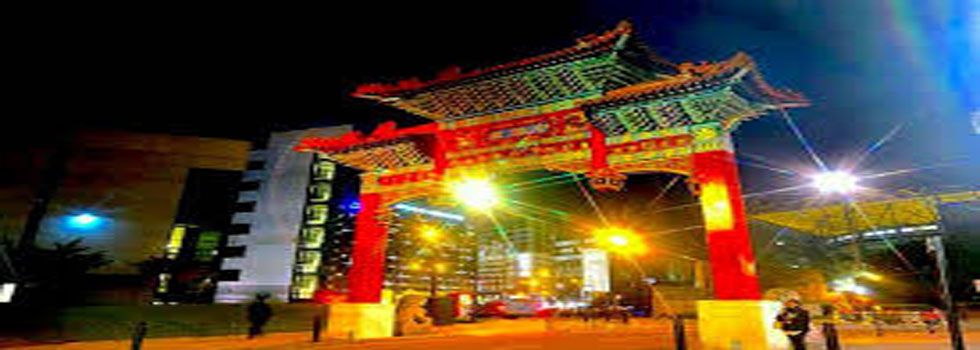NBCEA

Northern Business Chinese Entrepreneurs Association
Our History
Visitors to St John’s Cemetery in Elswick, Newcastle, might have chanced upon an intriguing headstone written in Chinese letters. It dates back to 1881 and is dedicated to a Chinese sailor who died of tuberculosis on board a transport ship after arrival at an Elswick shipyard. Presumably it’s the Armstrong Whitworth yard as during the 1880s four cruisers - the Yangwei and Chaoyong in 1881 and the Zhiyuan and the Jingyuan in 1887 - were designed and built for the Chinese navy. This, according to Jimmy Tsang, is the first connection between China and the North East.
Today, the community is more than 35,000 Chinese residents living in Newcastle and its surrounding areas (this includes the ever increasing Overseas Chinese students from mainland China, Hongkong, Taiwan, and many parts of South East Asia) and at its heart is Stowell Street in Newcastle. It boasts an enticing collection of restaurants, a supermarket and a bustling Chinese community centre. Exotic and welcoming at the same time, it’s a place where foodies like to come for a taste of the Orient served up in their own city. However between the 1880s and up to the 1950s, according to Jimmy, nothing much happened to further develop the link. It was from then the real concerted arrival of the Chinese to Newcastle and this region began. Most came here by natural migration, in search of business opportunities.
The first Chinese restaurant in Newcastle was the Marlborough Café on Scotswood Road which opened its doors in 1949 when the estimated Chinese population was about 30. Another 14, including the May Kway in Northumberland Street, followed by 1962, but none on Stowell Street. However that was quickly to change, as Jimmy explains. “In the 1960s, 70s and 80s Chinese people started to emigrate to the North east, mostly from Hong Kong, like me,” he said. Jimmy arrived in 1974 as a 13-year-old, some years after his dad, who had arrived in 1966, but had wanted his son to remain in Hong Kong to finish junior school. “When I came over my first impressions was that it was cold, damp and lonely because in the 1970s you would hardly see any Chinese on the streets. It was only in the 1980s you could see the community grow and of course today there are plenty of Chinese people around.”
A year after Jimmy Tsang’s arrival - in 1975 - there was a landmark occasion for the community as Peter Cheng opened his Chinese supermarket – the Wing Hong store – in Westgate Road. According to Mr Tsang, Mr Cheng was a farmer who had first settled in Newcastle. Then in 1978 Mr Cheng took a gamble and moved it to Stowell Street. At the time it was not a welcoming place. Located not far from Newcastle United’s St James’ Park ground, it was drab, cheerless and full of boarded up and derelict buildings. But following Peter’s lead, more chinese community to follow and the momentum grew.
In the 1980s came the Jade Garden, the Ming Dynasty, the Mandarin and the King Neptune. The development was helped by, in 1979, the founding of the North East Chinese Association (NECA) by a group of volunteers (Dr Robert Ng, Mr Peter Cheng, Mr Tony Chu were among many founders) endeavouring to establish useful free services originally aimed at the local Chinese community in Newcastle . Over the years, the association, operating mainly out of the Stowell Street community centre, gained recognition from the city council and other organisations.
In 1988 businesses along Stowell Street were allowed to have signs in Chinese as well as English as part of a masterplan to develop the centre. An 11-metre high Chinese Arch (built in 2004 by Shanghai craftsmen and funded by grants from the Newcastle City Council, One NorthEast and the Lottery) was erected on St Andrew’s Street, flanked by two Chinese guardian lions and facing St James’ Park football stadium. Now Stowell Street is one of only five Chinatowns in England, with the other four being in London, Manchester, Birmingham and Liverpool. It is well known for its Chinese New Year celebrations when, traditionally, volleys of firecrackers are let off to ward off evil spirits while singers and dancers line the streets of Newcastle to mark the start.
Many Chinese who live in Britain today came in the 1960s from Hong Kong and set up ‘Takeaway’ food shops and other related business, while Chinese from mainland China, Taiwan, South East Asia (Malaysia, Singapore, Indonesia, Vietnam, etc) came for education and university degrees. The 1991 Census put the number of Chinese in Britain at 156,938. In the mid-1990s, there was another influx of Hong Kong Chinese immigrants who were granted British passports as a result of the ‘hand-over’ of Hong Kong to mainland China (July 1997). These new immigrants are better educated and have better professional skills.
As chinese community in Newcastle is now growing to more than 35,000 strong population, Therefore, it is important that Newcastle China Town has website to serve as a central site to provide periodic information, promotion, tourist information and articles relating to Newcastle China Town on local businesses, Chinese Culture and lifestyles.
The idea of the community website was first conceived in the summer of 1999, the time it takes for research and talking to businesses and the community organizations, to find out about the needs, lead to this final version being launched on the 30th July 2002. Even then creating individual websites for the Chinese businesses and organizations didn’t make sense, or that not many businesses or organizations are prepared to spend the time and money to develop its own site. Mr Ken Cheng, Mr Roddy Yang, Ms Chikay Tang, the founder of this Newcastle ChinaTown website, creating a presence that united them all. The community website will be a wide-based, lively, entertaining and informative forum where local people can exchange views and share their memories, talents, interests, concerns and hopes for the future. It will become a means for identifying and solving problems faced by the community, for example
” Identifying social needs and attracting education, health and other services
” Identifying employment needs and attracting job-creating initiatives
” Identifying business opportunities and attracting investments to support enterprises in the local community
The website project will be a means for helping local people develop their own career or business. Working for the website project either on a voluntary or paid basis (if funding allows) will develop marketable skills including technical internet services; internet design; journalism; sales, advertising and marketing; community services; administration. The community website project could become the basis of a new local IT industry with excellent growth potential for the years ahead. By providing an attractive and engaging show-case for the community, the website will work as an ambassador between local people and the wider community across the region, nation and worldwide. The community website will become the gateway into the ChinaTown community for a wide range of visitors; from students, tourists, to local and national government agencies.
ChinaTowns are now established in many major cities around the world. It was said that the bigger the ChinaTown the more it reflects the success of the City. For most Chinese Immigrants, locals and tourists ChinaTown was and still is part of a great heritage and cultural identification, where a lot of locals and tourists alike come for Chinese groceries, Chinese food and Chinese publications or just to soak up the hustle and bustle of everyday life in this great cultural city; Newcastle. We hope you find our services useful and enjoy your visit to Newcastle ChinaTown.















